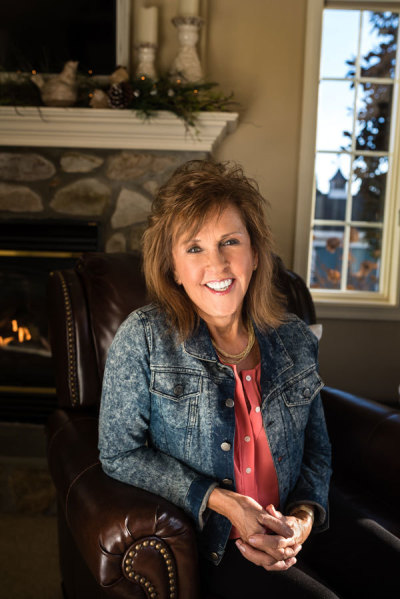Auntie Anne's founder says living out James 5:16 helped her heal from life of suffering: 'God is good'

The founder of Auntie Anne's Pretzel company says the principles of leadership that catapulted her business from a single pretzel stand in Pennsylvania in 1988 to an iconic franchise located in malls and airports nationwide emerged from faith and suffering.
Anne Beiler published an op-ed last week in The Christian Post laying out her principles of leadership from her 2021 book Overcome and Lead, which she said came in part from her faith-based upbringing on a farm with seven siblings in the Amish-Mennonite community of Lancaster County, Pennsylvania.

"My mom and dad were great parents," she told CP in a recent interview, noting that they provided her a "safe and secure lifestyle."
"They taught us about God, and going to church and sitting around the table three times a day for meals was just our culture," she said. "And so, in that setting, I felt like they gave me a really good foundation to weather the storms of life."
Even so, Beiler said she couldn't have anticipated the storms that would come her way, which she recounted in her 2019 book The Secret Lies Within.
Tragedy struck Beiler's family in 1975 when her 19-month-old daughter, Angela, was killed in a farming accident, an event she said would lead her through a dark spiritual valley that would ultimately transform her view of God's grace.
"As Angie made her ascent into Heaven that day, I began my slow and gradual descent into a world of emotional pain and spiritual confusion," Beiler said. "Because I'd been a good girl, the question became, 'Why?'"
Beiler said her pain compounded when a pastor she went to for counseling took advantage of her physically and pulled her into a secretive, abusive relationship that lingered for nearly seven years.
"That became worse than losing our daughter," she said. "Because as I left his office, I didn't understand anything about abuse, abuse of spiritual power, sexual abuse. I was not familiar with that world at all."
"But when I left his office, I made a choice," she continued. "And I decided I would never tell anyone what he did to me. But that one choice I made kept me in a life of secrets for almost seven years; a life of secrets and abuse during that whole time, without me telling anyone or anyone knowing anything about it."
Beiler said keeping the abusive relationship a secret led her to feel like she was "dying inside." It dragged her into a deep spiritual depression and to the brink of suicide.
"I went from being kind of the life of the party and always having something to do or say, enjoying life, to isolation and despair," she said. "At one point, I thought I had only one option: that would be to take my life because I knew and I believed for sure I'd gone from being a good girl to a very bad girl."
Amid the abuse and shame, she came to believe that she was irreparably broken.
"I didn't understand that it really wasn't my fault," she said. "I know a whole lot more about it today than I did back then and I understand it better. But at that time, it just felt like life was over. I knew that I was unlovable, I knew I was unforgivable, and I knew I was unchangeable, and there was really no hope for me."
Beiler said she believed during her Amish-Mennonite upbringing she could maintain God's favor as long as she was a good person, and that "life is good, and God is harsh." God used the darkest experiences of her life to bring her to an understanding that the inverse is true.
"And what I know today, through over seven decades of life's experiences, is that life is hard, and God is good," she said. "And I'm not confused about that anymore."
Beiler said she began to find healing after applying a principle in James 5:16, which exhorts believers to "confess your sins to one another and pray for one another, that you may be healed."
"I know it's so compact. It seems so simple," Beiler said of the biblical command. "But I can tell you, it's the most difficult thing anyone does if they've been caught in the dark world and they can hardly find their way out. But it's really the only way out."
At first, she finally confessed her yearslong situation to her husband Jonas, and the two began their journey toward reconciliation. When she later sought counseling with Emerge Counseling Ministries, founded by the Rev. Richard Dobbins, she said she was urged to probe the anger she might be harboring.
When she told Dobbins her story, she said he told her that what she suffered was not her fault.
"Nobody had said that to me, and that was almost 15 years after the fact," she said. "And I carried the belief that it was all my fault — the guilt and the shame of it were all my fault."
Such a revelation caused something inside of her to "come to life," and she ultimately realized it was true. At first, she did not believe she was angry, but as she explored her feelings, she understood she was suffering from anger toward her abuser, her husband, God and ultimately herself.
"As long as you blame, there's no healing for you," she said. "And so the anger that I felt inside, I honestly had it buried so deep that I didn't even understand that I was angry."
She eventually realized that neither God nor her husband was worthy of anger, but she still struggled with forgiving herself.
"I turned, I still turn, the anger inward toward myself," she said. "I still carried the guilt and the shame of what I had done to my husband, what I'd done to my family, my two beautiful daughters. And even after all of that, I still felt the burden of that."
Overcoming such deep and painful emotions was a complex process, she said. But as she began telling her story at first to friends and later to the public, her "anger began to subside."
In 2003, as she felt herself begin to slip again into depression, she said she cried out to God, whose grace she came to realize was sufficient.
"He spoke to me in that moment," she said. "It was not an audible voice, but it was directly from Heaven. It was a huge interruption. And he said to me, 'Anne, I have done everything there is to do for you.'"
Overcome with the power of Jesus Christ's life, death and resurrection, Beiler said she felt that God was calling her to forgive herself.
"I had never heard of self-forgiveness," she said. "I didn't even know I needed to forgive myself. But it was so powerful and so strong that all I could do was respond and say yes."
Even though she still struggles with lingering memories of her past and her shortcomings, she said she no longer feels the guilt or shame she did because she came to realize Jesus took it on Himself.
"I was carrying the shame because I could not forgive myself," she said. "Somebody had to pay, and I was paying through carrying shame."
Although she once felt "dead on the inside" because of her shame, she says, "Today I'm alive."
"I love my life," she said. "I love my Savior. I love the redemption. I love my family. I'm walking in the light. Is life easy? No, you still live life, but you're in a whole other world. And it's amazing to me how Jesus has redeemed every part of me."
Beiler has written three books about her spiritual journey and founded Broken Silence in 2018 to teach and equip women about living a lifestyle of confession.
Jon Brown is a reporter for The Christian Post. Send news tips to [email protected]






















